Music Educators Association of New Jersey
Serving teachers and students since 1927



“LEONARD BERNSTEIN – the American Renaissance Man. Celebrating the Great Musician’s 100th Birthday” was the subject of the extremely interesting lecture-recital by Juliana Osinchuk. She explored Bernstein’s multifaceted life, accomplishments, his ever-changing compositional styles through musical examples, and memoirs from people who knew him.
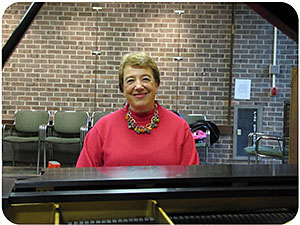 Dr. Osinchuk is a graduate of Conservatoire de Musique in Paris and the Juilliard School and was a National Endowment for the Arts solo recitalist grant recipient. She performs internationally as a pianist and harpsichordist and is active as a music educator. For 15 years she served as artistic director of the Anchorage Festival of Music. She founded and directs the Young Alaskan Artists Award program, which is celebrating its 20th year.
Dr. Osinchuk is a graduate of Conservatoire de Musique in Paris and the Juilliard School and was a National Endowment for the Arts solo recitalist grant recipient. She performs internationally as a pianist and harpsichordist and is active as a music educator. For 15 years she served as artistic director of the Anchorage Festival of Music. She founded and directs the Young Alaskan Artists Award program, which is celebrating its 20th year.
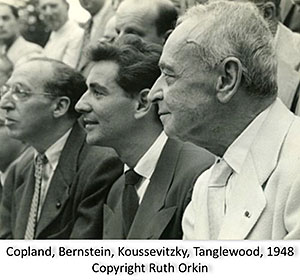 Leonard Bernstein (August 25, 1918, Lawrence, MA - October 14, 1990, New York, NY) was a most celebrated iconic American composer, conductor, pianist, educator, author, and above all – humanitarian, having a career spanning nearly five decades. No musician in the history of America touched so many people so deeply and in so many ways. His awards list is very long and includes the Lifetime Achievement from Grammy and 11 Emmy awards. Born into a Jewish immigrant family, he had pursued his musical education over the strong objections of his father. Although he had taken piano lessons from the age of ten, and taken courses in music theory at Harvard University (A.B., 1939), where he studied business, his professional musical training began in 1939 at the Curtis Institute. The following summer, at the Berkshire Music Festival, he met Serge Koussevitsky, who was to be his chief mentor during his early years. His other important musical influences were Fritz Reiner and Aaron Copland.
Leonard Bernstein (August 25, 1918, Lawrence, MA - October 14, 1990, New York, NY) was a most celebrated iconic American composer, conductor, pianist, educator, author, and above all – humanitarian, having a career spanning nearly five decades. No musician in the history of America touched so many people so deeply and in so many ways. His awards list is very long and includes the Lifetime Achievement from Grammy and 11 Emmy awards. Born into a Jewish immigrant family, he had pursued his musical education over the strong objections of his father. Although he had taken piano lessons from the age of ten, and taken courses in music theory at Harvard University (A.B., 1939), where he studied business, his professional musical training began in 1939 at the Curtis Institute. The following summer, at the Berkshire Music Festival, he met Serge Koussevitsky, who was to be his chief mentor during his early years. His other important musical influences were Fritz Reiner and Aaron Copland.
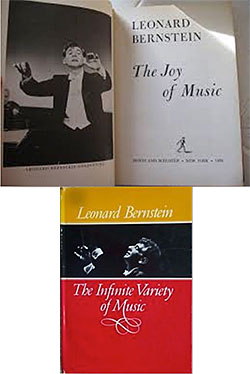 Bernstein had a complex nature, which was reflected in his life, endeavors and compositions. He was both flamboyant and introverted, a loving husband and father, gay, and an activist. Bernstein was a very generous person who helped and encouraged thousands of young musicians. As an educator, Bernstein conducted seminars at Brandeis University (1952–1957) and taught at Tanglewood. He also found large audiences through television, where his animation and distinguished simplicity had an immediate appeal. He established and conducted 53 televised Young Peoples’ Concerts exploring great works of classical music with commentaries. Yo-Yo Ma was 7 when he appeared in one of these. Two books of essays, Joy of Music (1959) and Infinite Variety of Music (1966), were direct products of television presentations.
Bernstein had a complex nature, which was reflected in his life, endeavors and compositions. He was both flamboyant and introverted, a loving husband and father, gay, and an activist. Bernstein was a very generous person who helped and encouraged thousands of young musicians. As an educator, Bernstein conducted seminars at Brandeis University (1952–1957) and taught at Tanglewood. He also found large audiences through television, where his animation and distinguished simplicity had an immediate appeal. He established and conducted 53 televised Young Peoples’ Concerts exploring great works of classical music with commentaries. Yo-Yo Ma was 7 when he appeared in one of these. Two books of essays, Joy of Music (1959) and Infinite Variety of Music (1966), were direct products of television presentations.
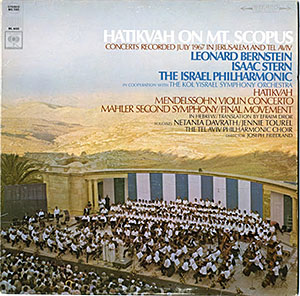 Bernstein’s passion for music was all encompassing — not just classical, but also jazz, rock, film, and musicals. Bernstein was the first American to overcome the European hegemony over conducting positions with ranking world orchestras. He was only 26 when he led the New York Philharmonic, stepping into the breach created by an ailing Bruno Walter. In 1958 Bernstein became music director of the New York Philharmonic, and in 1969 – lifetime laureate conductor. After leaving the Philharmonic, Bernstein traveled extensively, serving as guest conductor for many of the majorc osynmdupchtoonr ies of the world, including the Vienna Philharmonic and the Berlin Philharmonic. His appearances overseas brought about an excitement approaching frenzy. These responses were due in part to Bernstein's energy and emotion.
Bernstein’s passion for music was all encompassing — not just classical, but also jazz, rock, film, and musicals. Bernstein was the first American to overcome the European hegemony over conducting positions with ranking world orchestras. He was only 26 when he led the New York Philharmonic, stepping into the breach created by an ailing Bruno Walter. In 1958 Bernstein became music director of the New York Philharmonic, and in 1969 – lifetime laureate conductor. After leaving the Philharmonic, Bernstein traveled extensively, serving as guest conductor for many of the majorc osynmdupchtoonr ies of the world, including the Vienna Philharmonic and the Berlin Philharmonic. His appearances overseas brought about an excitement approaching frenzy. These responses were due in part to Bernstein's energy and emotion.
As a composer Bernstein was a controversial figure. His large works, including the symphonies Jeremiah (1943), Age of Anxiety (1949), and Kaddish (1963), were not considered masterpieces. Yet they are skillfully shaped and show his sensitivity to small changes of musical variety. He received more praise for his Broadway musicals.

The vivid On the Town (1944) and Wonderful Town (1952) were followed by Candide (1956), which, though not a box-office success, is considered by many to be Bernstein's most original score. West Side Story (1957) received international praise. Bernstein's music, with its strong contrasts of violence and tenderness, determines the feeling of the show and contributes to its special place in the history of American musical theater. In 1971 his Mass: A Theatre Piece for Singers, Players and Dancers premiered at the Kennedy Center in Washington, D.C. The huge cast performed songs in styles ranging from rock to blues to gospel. Mass debuted on Broadway later that year and was the first American work staged at the Vienna State Opera. Bernstein became caught up in the cultural upheaval of the late 1960s. He angered many when he claimed all music, other than pop, seemed old-fashioned. Politically, too, he drew criticism.
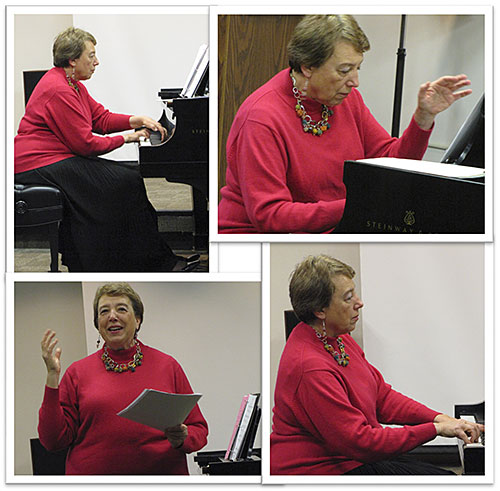
Dr. Osinchuk played excerpts and talked about Mass, Candide, Prelude, Fugue and Riffs (written for Benny Goodman, commissioned by Woody Herman), and, in greater detail – about Kaddish Symphony, scored for speaker, soprano solo, adult mixed choir, boys choir, and orchestra. Bernstein wrote the speaker’s libretto himself in Hebrew, Aramaic and English, envisioning an era in which humankind was distanced from God and on the verge of self-destruction. The speaker decides to recite Kaddish, her own Kaddish, fearing that there will be no one left alive to say it after her death. She chides God for having promised never to destroy the world only to allow His children to do it for Him. And she is all of humankind – a disobedient child and an angry lover. She calls God to a Din-Torah (a Torah judgment) for breaking Divine promises, but ultimately reconciles herself to Him and allows herself to again speak His praise. Bernstein was inherently an optimist and believed in the goodness of humanity. Although all of the imagery derives from the Bible, the speaker’s identity and passions are driven by Jewish history and philosophy. In this composition, Bernstein made his only forays into an exploration of the possibilities of 12-tone music.
At the conclusion of her amazing presentation, Juliana Osinchuk performed Bernstein’s piano work Touches, composed for the Van Cliburn Piano Competition, and her own brilliant arrangement for solo piano, The Best of West Side Story.
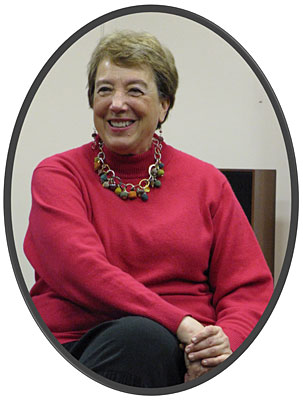
Sophia Agranovich, Programs Committee Chair, Hostess, and writer
Nancy Modell, page design and event photos